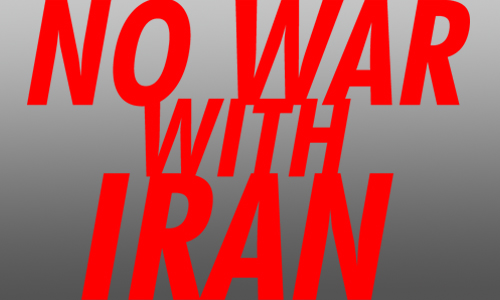January 11, 2020
We, the undersigned, are opposed to war as a solution to resolving hostilities between the Government of the United States and Iran. We call on Congress to use its powers of the purse to stop this senseless rush to war that can only end with disastrous consequences. We condemn assassinations and terrorism as instruments of Government policy and demand that the U.S. Government cease its provocations of Iran and seek diplomatic channels to resolve its political differences. We call on academics and academic institutions everywhere to join with us in raising our voices against war and in seeking a peaceful resolution of this conflict.
Whatever one may think about Iran or General Sulemani, the assassination was an arrogant display of American power; a cold-blooded killing of a Government official working for a UN member state that occurred on the territory of another sovereign country. At the very least, the act was a brazen violation of all norms of international law, and a clear act of aggression and provocation that continues to threaten an escalation of dangerous geopolitical tensions in the region.
Officials of the U.S. Government justified the murder of the Iranian General by claiming that he was plotting attacks on Americans, but the Trump Administration has produced no evidence for these claims. If anything, American representations about General Suleimani follow a longstanding practice of misinformation enlisted to justify war that go back to the Spanish American War of 1898 and include the more well-known and recent incidents of the 1964 Gulf of Tonkin incident, and the false claims given for the Iraq War in 2003.
The assassination of General Suleimani is the latest action in a pattern of aggression and threats directed toward Iran by the American Government. In the short-term, this aggression began with the American withdrawal from the agreement negotiated between Iran and virtually the entire world community that severely restricted the capacity of the Islamic Republic to develop nuclear weapons and subjected the country to a rigorous inspection regime. In the long-term, such aggression can be traced back to the 1953 CIA-assisted overthrow of Mohammad Mosaddegh and the reinstatement of the murderous regime of Shah Reza Pahlavi.
Though at the time of writing the two sides have stepped back from further escalation, that devastating prospect is now more likely as the two remain on the type of high alert that led to the downing of Ukraine International Airlines flight 752 that tragically took the lives of 176 people. The Trump administration’s pursuit of its extremist “maximum pressure campaign,” which includes sanctions that wreak devastating consequences on the Iranian people must be urgently reversed so as to continue to ease tensions and create the prospect of a real diplomatic solution.
As professors, students, and educators in the field of Communication Studies, we feel it is our obligation to speak out. Silence, we believe, is a form of complicity. Let us also say also, for those who will predictably rush to dismiss these critiques as partisan or unpatriotic—standard responses to reasoned critique that can be seen throughout U.S. history—these criticisms should in no way be misconstrued as a form of solidarity with Iran’s political project. We have no illusions of the regime’s long-standing abuses of human rights and suppression of legitimate dissent. As educators in a highly militarized context in the U.S., however, it is our first priority to sound the alarm about the dangerous provocations being perpetrated by our government and call for peace loving people who, regardless of political affiliation, are tired of endless wars in our name and are willing to raise their voices together to call for their end.


